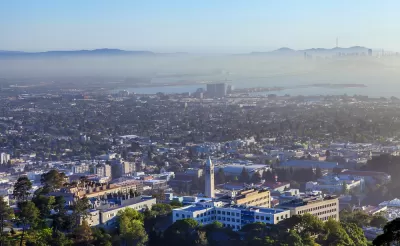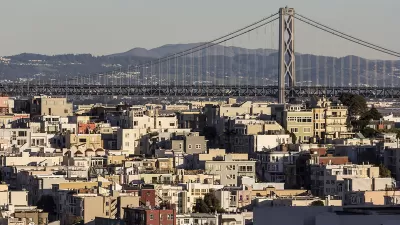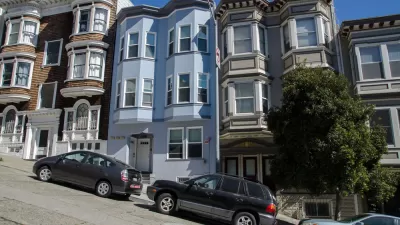One person’s return to the San Francisco Bay Area meant facing the dystopian realities of the rental market.

Living in the San Francisco Bay Area is not cheap or easy, says Wes Enzinna, in a first-person account of his own housing struggles and the drastic changes that had ensued in the 10 years since he had lived there last. He could not even find housing when he moved back to Oakland for a full-time job as an editor. He finally lands a shack, an unfinished tiny-house experiment in someone’s backyard:
There was no plumbing or running water to wash my hands or brush my teeth before sleep. Electricity came from an extension cord that snaked through a yard of coyote mint and monkey flower and up into a hole I’d drilled in my floorboards. The structure was smaller than a cell at San Quentin—a tiny house or a huge coffin, depending on how you looked at it—four by eight and ten feet tall, so cramped it fit little but a mattress, my suit jackets and ties, a space heater, some novels, and the mason jar I peed in.
He was living in West Oakland, an area with seedy motels, liquor stores, and rundown houses, but where homes were still selling for over $1 million to the continuing stream of high-income tech workers. He describes an extreme contrast of wealth and poverty, privilege and hopelessness: residents driving their Teslas from their fortified residential compounds and others hunkering down nearby in tent cities under the freeway.
Enzinna explores the issue of the widespread lack of affordable housing in the Bay Area and in much of California through his own experience—he later moves to a studio in San Francisco’s Telegraph Hill neighborhood—as well as that of people in his life. He was living in Oakland when a fire at the Ghost Ship, an artist collective, killed 36 people, and the aftermath of that tragedy put housing even more out of reach for the area’s most vulnerable residents:
In the year following the Ghost Ship fire, the nonprofit Safer D.I.Y. Spaces estimated that the city’s investigations of similar buildings led to the eviction of about eighty people—that many more added to the swelling population of homeless and displaced. Meanwhile, Oakland mayor Libby Schaaf exploited the tragedy by supporting laws streamlining the development process of condo projects, cynically claiming that they were a solution to the crisis exemplified by Ghost Ship because they created more housing—never mind that these condos were far out of reach of the bohemians who lived in places like Ghost Ship, much less the even more desperate folks, the truly impoverished, on the streets and in the tent cities.
Enzinna eventually heads back to New York, unable to keep up with the rent and increasingly unwilling to tolerate the façade that maintained a world of haves and have-nots in San Francisco. "In my case, I was finally forced back to reality by my credit-card debt: in less than six months in North Beach, I racked up $12,000 in charges trying to cover my bills and rent. The people of San Francisco weren’t happy. They were insane."
FULL STORY: Gimme Shelter

Study: Maui’s Plan to Convert Vacation Rentals to Long-Term Housing Could Cause Nearly $1 Billion Economic Loss
The plan would reduce visitor accommodation by 25,% resulting in 1,900 jobs lost.

North Texas Transit Leaders Tout Benefits of TOD for Growing Region
At a summit focused on transit-oriented development, policymakers discussed how North Texas’ expanded light rail system can serve as a tool for economic growth.

Using Old Oil and Gas Wells for Green Energy Storage
Penn State researchers have found that repurposing abandoned oil and gas wells for geothermal-assisted compressed-air energy storage can boost efficiency, reduce environmental risks, and support clean energy and job transitions.

Planting Relief: Tackling Las Vegas Heat One Tree at a Time
Nevada Plants, a Las Vegas-based nonprofit, is combating the city’s extreme urban heat by giving away trees to residents in underserved neighborhoods, promoting shade, sustainability, and community health.

How Madison’s Tree Planting Efforts Are Growing a Healthier Community
Madison’s annual tree planting initiative is enhancing environmental resilience, public health, and community livability by adding 1,400 carefully selected trees citywide, with strong community and institutional support for urban forestry.

Texas State Bills Could Kill Transit Funding in Dallas, Austin
State lawmakers could pull funding from the state’s largest transit agency and the ambitious Project Connect, a voter-approved transit project in Austin.
Urban Design for Planners 1: Software Tools
This six-course series explores essential urban design concepts using open source software and equips planners with the tools they need to participate fully in the urban design process.
Planning for Universal Design
Learn the tools for implementing Universal Design in planning regulations.
Ascent Environmental
Borough of Carlisle
Institute for Housing and Urban Development Studies (IHS)
City of Grandview
Harvard GSD Executive Education
Toledo-Lucas County Plan Commissions
Salt Lake City
NYU Wagner Graduate School of Public Service




























